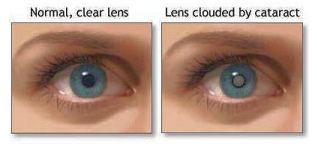All About Cataracts
 Cataracts are an extremely common eye disease that affects most people as they reach age 60-70 years old. A cataract is an opacity of the lens that dims and distorts the image projected onto the retina. It can progress to reversible blindness if not surgically removed. Cataract surgery is one of the most common types of surgery performed in America.
Cataracts are an extremely common eye disease that affects most people as they reach age 60-70 years old. A cataract is an opacity of the lens that dims and distorts the image projected onto the retina. It can progress to reversible blindness if not surgically removed. Cataract surgery is one of the most common types of surgery performed in America.
What Causes Cataracts
Cataracts are caused by age and by harmful UV rays, often from the sun. Studies have shown that the majority (80%) of this damage is caused when we are still under 20 years old. However, the symptoms and signs of cataracts do not tend to appear until later in life, around 60-70 years old. Other causes of cataracts include genetic causes, trauma, diabetes, toxicity, inflammation, and infection.
When To Have Cataract Surgery
 Your optometrist will discuss their recommendation for surgery with you. It is very rare for cataracts to hurt your physical health or cause any pain. Cataracts only cause problems with vision. For this reason, patients often wait too long to get cataract surgery. In one study, 80% of patients polled after surgery said that they wish they had the surgery sooner. Still, the decision will always be yours.
Your optometrist will discuss their recommendation for surgery with you. It is very rare for cataracts to hurt your physical health or cause any pain. Cataracts only cause problems with vision. For this reason, patients often wait too long to get cataract surgery. In one study, 80% of patients polled after surgery said that they wish they had the surgery sooner. Still, the decision will always be yours.
What Will Cataract Surgery Be Like?
You can expect to have at least 5 visits to an eyecare provider to perform surgery on one eye:
| Consultation | Before the surgery day, you will go in for a consult with the eye surgeon. |
| Surgery Day | On surgery day, it will take 15 or so minutes for the surgeon to remove the anterior lens capsule, dissolve the lens with ultrasound waves (phacoemulsification), remove the dissolved lens via a small cut in the edge of your cornea (the 'ECCE' procedure), and replace the lens with a prosthetic one. The prosthetic lens is like a permanent contact lens inside your eye. No stitches or bleeding will occur. |
| Post Op Visit 1 | 1-2 days after surgery, you will be seen by the surgeon or by me, your optometrist, to make sure you do not have any post-surgical complications. |
| Post Op Visit 2 | 1-2 weeks after surgery, you will likely be seen a second time to make sure it is safe to take you off of your post-operative eye medication. |
| Post Op Visit 3 | 4-6 weeks after surgery, your prescription will have stabilized, and you may need new glasses. |
Phacoemulsification Cataract Surgery is extremely safe compared to most surgeries. You will not be admitted overnight to the hospital, and you will be able to see and walk before and after the surgery. Since the procedure itself only takes about 15 minutes, the vast majority of your time will be spent waiting for the surgery to begin. Only one eye will be operated on in a single visit. The surgery will be performed by an ophthalmologist, an eye surgeon. Also present will be an anesthesiologist who will keep you awake in a painless haze during the procedure.
